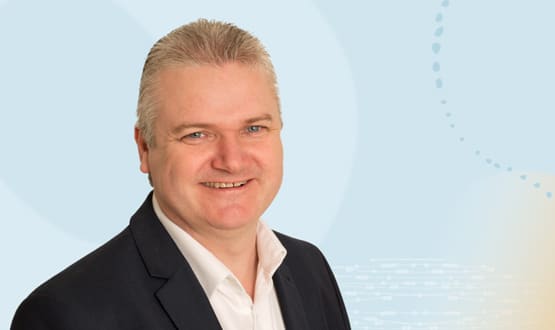Industry Spotlight: David Hunt, director, clinical product and revenue cycle development,Oracle Health
- 30 August 2023

For David Hunt, software development in healthcare is an ‘art form’ that saves lives, writes Lizzie Cernik
Growing up, David Hunt was fascinated by electronics. Encouraged by his father, who bought him his first computer in 1979, he began to explore the world of coding long before most people knew the impact it would have on society.
“It fascinated me that if I could think of something, then I could create a piece of software that others could see and use, that had only previously existed in my mind. That creativity is really important to developers and software engineers, as well as the ability to see and use the final product you have built,” Hunt explains.
Software development isn’t always considered creative, but for Hunt, the ability to bring ideas to life to solve real world problems makes it an incredibly worthwhile art form.
Before moving into healthcare, he worked as a data centre manager for a scientific publisher, then launched a gaming software company with his brother and some friends. When the company was bought out from under him, it made him reevaluate what was important in life. “My family was important, but I realised that so was my health. I could only provide for them if I was in good health, which inspired me to look at the healthcare industry and join Cerner, now Oracle Health, in 2006.”
Initially he presumed he would “stay for a while and move on”, but he’s been with the company for more than 17 years and is now director of clinical product and revenue cycle development.
UK and global projects
According to Hunt, it is the combination of the company’s innovation and passionate workforce that has made him want to stay. “I started by heading up the system engineering side looking after the hardware. However, I was given the opportunity to head up a team of application developers and this led to my current role. I now look after software engineers working on both UK and global projects. I oversee what the products are and get to see it rolled out on a grand scale, which is really exciting.”
For Hunt, working in healthcare software has allowed him to make a real, tangible difference in people’s lives. “Some of the algorithms we have developed have directly saved lives. For example, our software uses different indicators to help flag someone who is likely to be at risk of sepsis or kidney failure so they can be treated early. The system then supports clinical intervention to ensure people get help early.”
One of the latest projects that has sparked his passion is Oracle Cloud Infrastructure, cloud services that enable users to build and run a range of applications and services in a secure, reliable, and scalable environment. “It is high performance infrastructure, which helps to ensure that health trusts have access to the best possible service at all times,” he explains. “Because the services are in the cloud, it means the trusts are easily kept updated with the latest version of our code. New features can be rolled out easily, meaning we don’t have to do big software rollouts, which always contain some level of risk.” As a result, trusts can concentrate on frontline care, knowing there’s less risk of infrastructure challenges.
The right people
The high-performance infrastructure will also offer multi-layered security, reliability, scalability depending on the needs of the client. “With Oracle, we have the right people with the right knowledge of our products to make the work more efficient for healthcare organizations.”
Alongside improved infrastructure, Hunt believes that artificial intelligence (AI) will be another exciting area of growth in the healthcare technology space over the coming years. “There are huge potential future benefits,” he explains. “Already we are seeing that AI can recognise patterns and help identify people who might be at higher risk of certain conditions, for example.”
From the day he started working in healthcare technology, Hunt has been motivated to support clinical staff in providing a better service for patients. “Ultimately, we are trying to make it easier for doctors and nurses to do their job and spend more time with their patients. Stability of infrastructure is the real key because we can streamline workflows. That’s why we work so closely with UX design specialists to ensure our technology is fully accessible and will always be used in action. Some examples include keyboard navigation, screen reader functionality, and colour contrast,” he explains.
Exciting opportunities in tech
“Products need to ensure that functionality can also be navigated solely with a keyboard for those users with motor function or vision impairments and screen reader applications need to be able to translate text-to-speech for visually impaired individuals, who may also require alternate text, as well as audio and video options.”
Having seen the difference that software engineering can make on people’s lives, he’s also excited about the future opportunities for young tech enthusiasts in the years to come. “When software engineers come out of university, they don’t immediately think of working in healthcare, but that’s changing. There’s going to be so many opportunities within healthcare for talented people to use their skills and get hands on with leading edge technologies.
“At Oracle Health, I love that I am able to get my technology ‘fix’ but also feel like I’m making a difference. Everyone here goes above and beyond and understands the impact they can have not just for the customers, but for the patient, and for the family of that patient. If we can help in some small way, then it’s all worth it.”
Contact Oracle Health:
Website: www.oracle.com
Linkedin: Oracle Health
Twitter: Oracle Health




